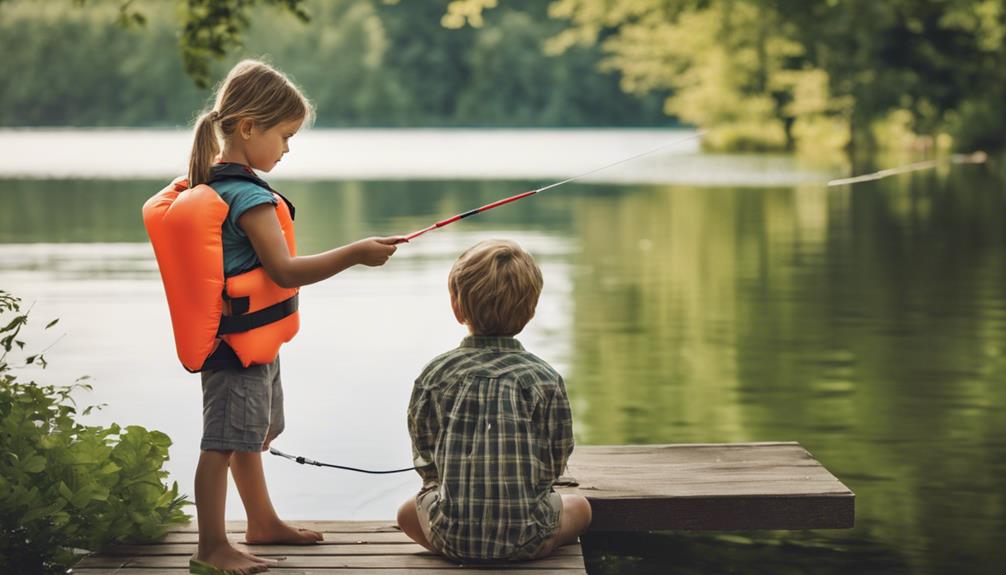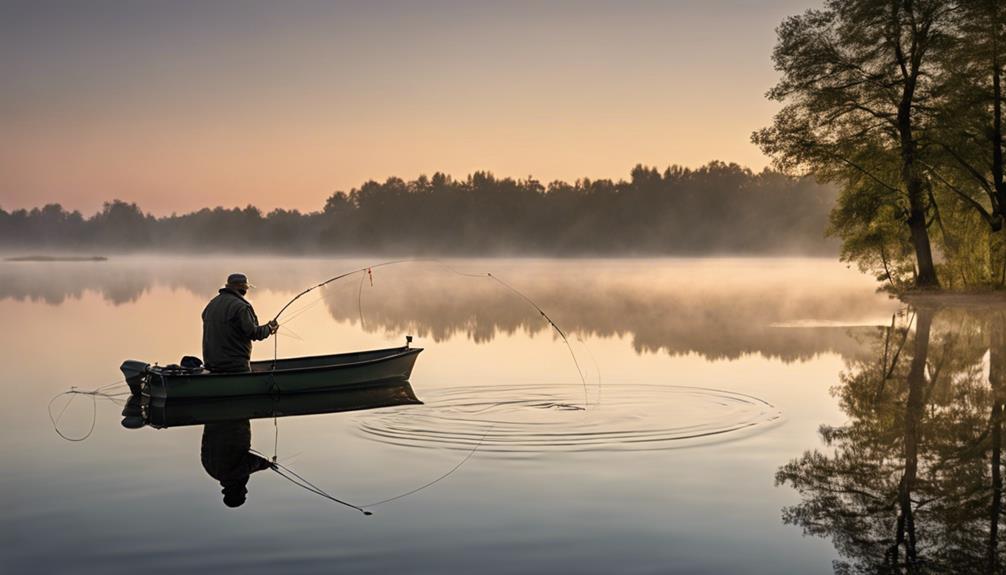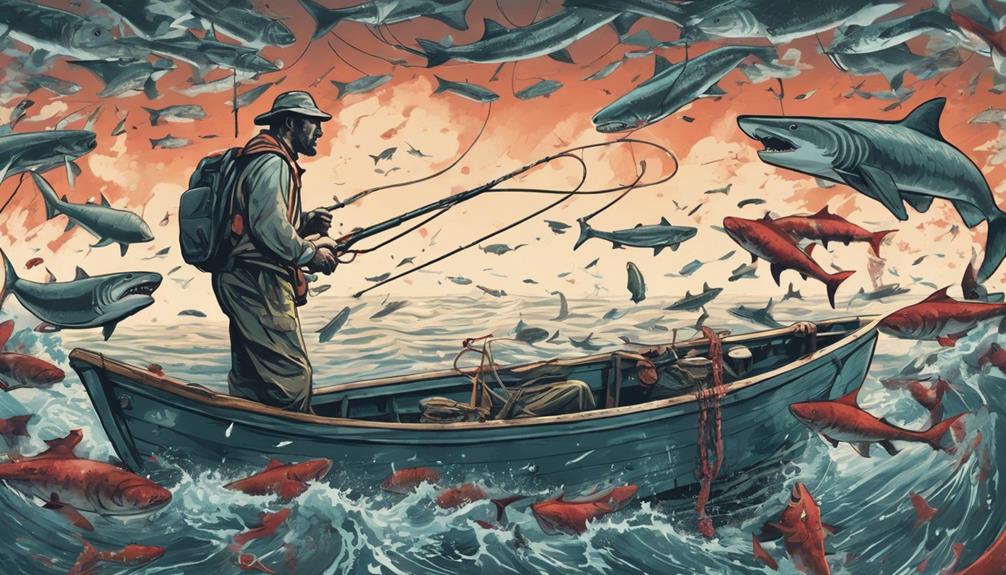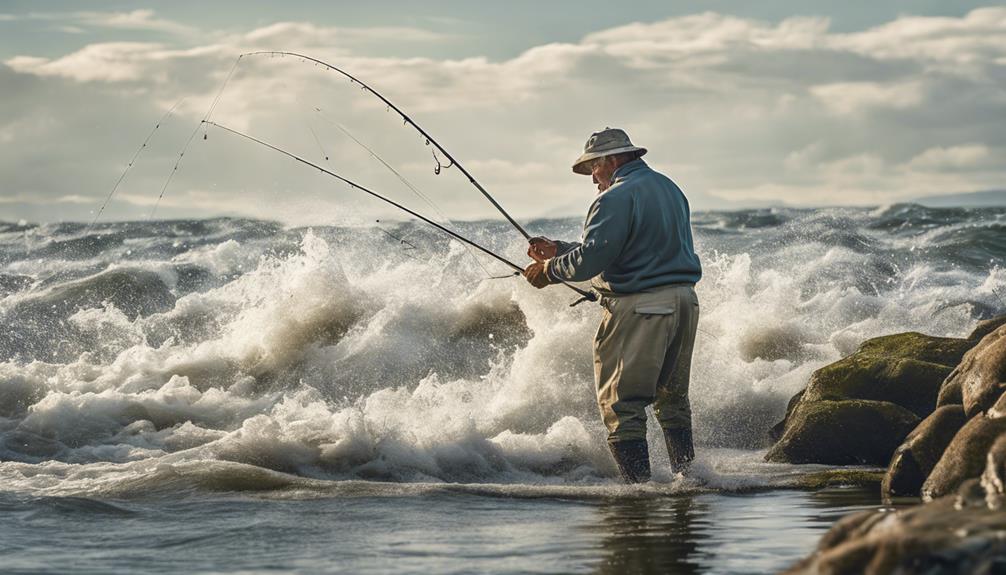Imagine setting sail on a fishing journey with your little ones, equipped with knowledge that ensures a safe and enjoyable experience.
From mastering the art of casting to navigating the waters responsibly, there are essential techniques to consider.
But what about the unexpected challenges that may arise during your angling escapade with the kids?
Selecting the Right Equipment
When choosing gear for kid-friendly fishing, prioritize simplicity and functionality over complexity. Opt for equipment that's easy to use and maintain to ensure a smooth fishing experience for your child. Look for budget-friendly options that still offer good quality to make the most of your investment. Safety gear is essential when fishing with kids, so make sure to have life jackets, first aid kits, and sun protection gear readily available. Additionally, choose age-appropriate tools that are lightweight and easy for small hands to handle.
When it comes to equipment maintenance, teach your child the importance of taking care of their fishing gear. Show them how to clean and store their equipment properly to prolong its lifespan. By instilling good maintenance habits early on, you aren't only teaching responsibility but also ensuring that the gear remains in good working condition for future fishing trips.
Explore different budget-friendly options when selecting fishing gear for your child. You don't need to break the bank to find suitable equipment. Many affordable options offer great quality and functionality, perfect for kids who are just starting to learn the ropes of fishing. Remember, it's not about having the most expensive gear, but rather choosing the right tools that are safe and easy for your child to use.
Teaching Proper Casting Techniques
To ensure your child learns proper casting techniques effectively, focus on mastering the basic casting motions with patience and practice. Start by teaching them the fundamental overhead cast, emphasizing smooth movements and releasing the line at the right moment.
Here are some tips to make learning casting techniques enjoyable for your child:
- Practice Makes Perfect: Encourage your child to practice casting regularly in an open area like a park or backyard. The more they practice, the better their casting accuracy will become.
- Fun Fishing Games: Make learning casting techniques fun by incorporating fishing games and challenges. Set up targets at different distances and create a scoring system to keep things engaging.
- Friendly Competitions: Organize friendly casting competitions between your child and their friends or siblings. This not only helps improve their casting skills but also adds an element of excitement to the learning process.
Ensuring Proper Hook Safety
For safe fishing practices with children, always prioritize ensuring proper hook safety. Proper handling of fishing hooks is crucial to prevent accidents and injuries. When fishing with kids, it's essential to teach them how to handle hooks safely. Start by showing them how to hold the hook by the shank, keeping the point away from their skin. Emphasize the importance of never running or playing with hooks in hand to avoid accidental pricks.
Another critical aspect of hook safety is proper removal. Teach children the correct way to remove a hook if it gets caught on something or someone. Instruct them to stay calm and not to jerk the line, which can cause the hook to embed deeper. Instead, show them how to carefully back the hook out the way it came in, applying gentle pressure to minimize any discomfort.
Always carry a first aid kit with you when fishing with kids, including tools like pliers specifically designed for hook removal. In case of accidental hooking, remain calm and reassure the child. If the hook is embedded too deeply or in a sensitive area, seek medical help immediately. By teaching children proper handling techniques and how to safely remove hooks, you ensure that fishing adventures remain fun and injury-free.
Understanding Water Safety Basics
Prioritizing water safety knowledge is essential for a successful and enjoyable fishing experience with children. When heading out for a fishing adventure with your little ones, it's crucial to ensure everyone is well-versed in water safety basics to prevent any accidents or mishaps. Here are three key points to keep in mind:
- Basic Swim Skills: Before embarking on any fishing trip, it's important that both you and your children have basic swim skills. Knowing how to float, tread water, and swim short distances can be invaluable in case of an unexpected fall into the water. Consider enrolling your child in swimming lessons to build their confidence and abilities in the water.
- Life Jacket Essentials: Make sure that every child wears a properly fitted life jacket while near or on the water. Life jackets are essential safety gear that can prevent drowning in case of an accident. Ensure that the life jacket is the right size for your child and that they understand how to properly wear it.
- Constant Supervision: Children should never be left unsupervised near water, especially during a fishing trip. Keep a close eye on them at all times and establish clear boundaries to ensure their safety. Remember, vigilance is key when it comes to water safety with kids.
Identifying Local Fishing Rules
Ensure you familiarize yourself with the local fishing rules before heading out for your fishing trip with children. Checking regulations and understanding restrictions are crucial to ensure a safe and enjoyable fishing experience with your little ones.
Before you set out on your fishing adventure, take the time to research and familiarize yourself with the specific rules and regulations that govern the area where you plan to fish. Different regions may have varying rules regarding catch limits, size restrictions, bait usage, and even specific fishing seasons. By being informed about these regulations, you can avoid potential fines and ensure that you're fishing responsibly.
Local fishing rules are put in place to protect the environment and fish populations, as well as to promote sustainable fishing practices. Understanding these rules not only helps you stay compliant with the law but also teaches children the importance of respecting nature and wildlife. By following the regulations set by local authorities, you set a positive example for your kids and instill in them the values of conservation and ethical fishing practices.
Practicing Catch and Release Methods
To enhance the sustainability of your fishing trips with children, consider implementing catch and release methods to promote fish conservation. This practice not only helps maintain fish populations but also teaches kids the importance of respecting nature and the environment.
Tips for Practicing Catch and Release Methods:
- Fish Handling: When practicing catch and release with kids, ensure they handle the fish with care. Teach them to wet their hands before touching the fish to protect its slime coat, which is crucial for its health. Avoid squeezing the fish tightly and support its body properly when holding it for a photo before releasing it back into the water.
- Conservation Education: Use catch and release as an opportunity to educate children about the significance of conservation. Explain why releasing smaller or protected fish helps in preserving the ecosystem's balance and ensures future generations can enjoy fishing too. Encourage them to ask questions and engage in discussions about the impact of their actions on the environment.
- Proper Equipment: Equip your young anglers with the right tools for catch and release, such as barbless hooks that are easier to remove, needle-nose pliers for a quick hook removal process, and a soft, knotless landing net to minimize harm to the fish's skin and scales. By using appropriate gear, you can make the catch and release experience smoother and safer for both the fish and your kids.
Supervising Kids at All Times
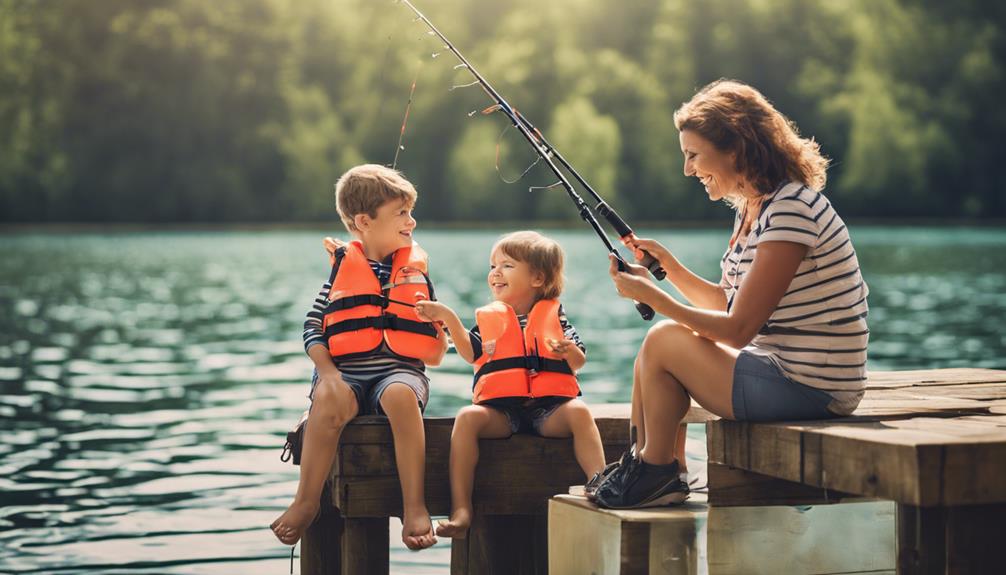
Supervise children closely throughout the fishing experience to ensure their safety and enjoyment. When near water, constant water supervision is crucial. Kids should always wear life jackets, and adults should be within arm's reach in case of any emergencies. Establish clear emergency protocols beforehand so everyone knows what to do in case of accidents.
Stay actively engaged with the kids while fishing. Encourage them to ask questions, teach them about the different fish species, and involve them in setting up the fishing gear. By actively participating, you not only ensure their safety but also make the experience more enjoyable for them.
Offer safety reminders regularly. Remind children about the importance of staying away from the water's edge, not running on slippery surfaces, and being cautious when handling fishing hooks. Emphasize the significance of following instructions to prevent any accidents.
Celebrating Fishing Successes
Celebrate your child's fishing successes with enthusiasm and encouragement. Each successful catch or milestone reached while fishing with your child creates lasting memories that they'll cherish for years to come. Here are three ways to make celebrating fishing successes even more special:
- Capture the Moment: Take a photo of your child proudly holding their catch or posing with their fishing gear. These photos will serve as a visual reminder of the fun times spent together and the milestones achieved while out fishing.
- Create a Fishing Journal: Start a fishing journal where you and your child can jot down details of each fishing trip, such as the location, weather conditions, notable catches, and any funny moments that occurred. This journal will become a treasured keepsake filled with fishing memories.
- Reward Achievements: Acknowledge and reward your child's fishing milestones, whether it's catching their first fish, learning a new fishing technique, or showing patience while waiting for a bite. Rewards can be simple, like a high-five or a special treat, to reinforce their accomplishments and encourage their continued interest in fishing.
Frequently Asked Questions
What Are Some Common Mistakes Parents Make When Supervising Kids During Fishing Trips?
When supervising kids during fishing trips, common mistakes parents make include not providing enough parental supervision and not teaching fishing etiquette. It's important to stay attentive to ensure your child's safety and well-being.
Additionally, teaching them proper fishing etiquette, such as respecting other anglers' space and handling fish with care, is crucial for a positive fishing experience.
How Can Parents Help Children Overcome a Fear of Handling Live Bait or Fish?
To help your child overcome fear of handling live bait or fish, start with small steps. Introduce child-friendly bait and teach gentle handling techniques.
Show them how to handle fish safely and explain the process calmly. Gradually involve them in the fishing experience without pressure.
Encourage them to ask questions and express their feelings. Positive reinforcement and patience are key to fear management in fishing adventures.
What Are Some Unique Safety Considerations for Fishing in Different Types of Bodies of Water (E.G. Rivers, Lakes, Oceans)?
When fishing in various bodies of water, safety should be a priority.
Always wear proper clothing and ensure you have safety equipment like life jackets.
Be aware of emergency protocols and understand the water conditions of the specific location you'll be fishing.
Rivers may have strong currents, lakes could be deep, and oceans might have unpredictable tides.
Stay informed and prepared to have a safe fishing adventure.
How Can Parents Ensure That Their Children Are Properly Hydrated and Protected From the Sun During Fishing Outings?
To keep your kids safe while fishing, focus on sun protection and hydration. Make sure they wear hats, sunglasses, and sunscreen to shield them from harmful UV rays. Encourage them to drink plenty of water throughout the day, especially in hot weather.
Fishing safety for children is crucial, so teach them to recognize signs of dehydration and heat exhaustion. By prioritizing sun protection and hydration, you can ensure a fun and safe fishing adventure for your little ones.
Are There Any Special Considerations or Techniques for Fishing With Children Who Have Disabilities or Special Needs?
When fishing with children who have disabilities or special needs, it's essential to provide inclusive accommodations and consider sensory strategies.
Utilize adaptive equipment to make the experience more accessible and enjoyable.
Communication tips can help ensure everyone is on the same page and having a great time.
Conclusion
Overall, fishing can be a fun and rewarding activity for kids, but safety should always come first. By following these kid-friendly techniques, you can ensure that your fishing adventures aren't only enjoyable but also safe.
Remember to always supervise your children, teach them proper techniques, and respect local fishing rules.
With the right equipment and knowledge, your family can create lasting memories out on the water.
Happy fishing!
